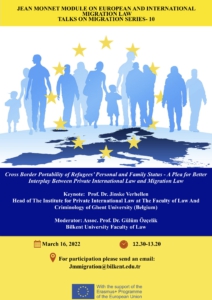Views
Nothing Found
Sorry, no posts matched your criteria
News
Funding opportunities EU Justice program (deadline extended)
Deadline extended: Funding opportunities under the justice programme in the area of judicial cooperation in civil and criminal matters (JUST-2022-JCOO).
The deadline for proposal submission to the call for proposals for action grants to promote judicial cooperation in civil and criminal matters has been extended.
The new deadline for submission is the 30 March 2022 – 17:00:00 CET, Brussel’s time.
The total budget available for the call is EUR 5.500.000. The co-financing rate is 90%.
The key priorities for 2022 under this call are to contribute to the effective and coherent application of the EU acquis relating to judicial cooperation in civil and criminal matters, thus strengthening mutual trust.
In particular, the call aims to
- facilitate and support judicial cooperation in civil and criminal matters
- promote the rule of law, independence and impartiality of the judiciary, including by supporting the efforts to improve the effectiveness of national justice systems, and the effective enforcement of decisions
The call-related documents, guidance and other instructions are available in the call page within the funding & tender opportunities portal (F&T).
Project activities under this call would in principle include:
- facilitating cooperation between competent authorities and agencies, legal practitioners and/or service providers (including multi-disciplinary networks at international, national, regional or local levels);
- mutual learning, identifying and exchange of best practices, development of working methods which may be transferable to other participating countries;
- analytical activities, including data collection, surveys, research, etc.;
- exchange and provision of information and development of information tools;
- capacity building for professionals;
- dissemination and awareness raising activities;
- training activities can also be funded under this call, as long as they are of ancillary nature and not the main purpose of the project.
Any further request for information can be addressed to EC-JUSTICE-CALLS@ec.europa.eu
Climate Change and Law Seminars of CCLLAB welcomes Prof. Dr. Sam Fankhauser on March!
Kadir Has University Climate Change and Law Laboratory (CCLLAB), continues its series of events on legal aspects of Climate Change. At the sixth session of Climate Change and Law Seminars, Kadir Has University Climate Change and Law Laboratory (CCLLAB) will be honored by the lecture of Prof. Dr. Sam Fankhauser on Trends in Climate Legislation. Event is open to public via Zoom. No formal registration required; we would appreciate however if you confirm your participation by sending an e-mail to ccllab@khas.edu.tr. To find out more about our lab, please visit https://ccllab.khas.edu.tr/
Sam Fankhauser is Professor of Climate Economics and Policy at the University of Oxford, where he is affiliated with the Smith School of Enterprise and the Environment and the School of Geography and the Environment. He is also Research Director of Oxford Net Zero. Before moving to Oxford, Sam was Director of the Grantham Research Institute on Climate Change and the Environment at the London School of Economics, where he remains a Visiting Professor. He has also worked at the European Bank for Reconstruction and Development (EBRD), the World Bank and the Global Environment Facility.
Online Conference: Cross Border Portability of Refugees’ Personal and Family Status – A Plea for Better Interplay Between Private International Law and Migration Law
You are kindly invited to the online conference on “Cross-border portability of refugees’ personal and family status – a plea for better interplay between private international law and migration law” by Prof. Dr. Jinske Verhellen on March 16, 2022, Wednesday between 12.30-13.30 (GMT+3). The conference is organized by Bilkent University as a part of the Talks on Migration Series within the Jean Monnet Module on European and International Migration Law. It will be held via zoom, free of charge. Please contact us (Jmmigration@bilkent.edu.tr) for participation.
Biography:
Jinske Verhellen is a Professor of Private International Law and Head of the Institute for Private International Law at the Faculty of Law and Criminology of Ghent University (Belgium). She is a member of the Ghent University Interfaculty Research Group CESSMIR (Centre for the Social Study of Migration and Refugees) and of the Ghent University Human Rights Research Network. She has published on various aspects of private international law, international family law, migration law, and nationality law.
Abstract:
The lecture will address several legal problems encountered by refugees with regard to their personal and family status acquired in one country and transferred to another country (such as the absence of documentary evidence, the issue of limping legal relationships). It will focus on the interactions between international refugee law (relating to the rights and obligations of States regarding the protection of refugees) and private international law (dealing with private relationships in a cross-border context). These two sets of rules still operate in very different and even separated universes. The following issues will be covered: specific private international law hurdles that refugees have to take, the concept of personal status (age, parental status, marital status) in international refugee law, and the role of private international law conventions in the international protection of refugees.




